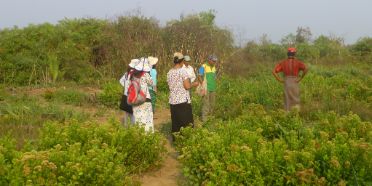International pre-study on community forestry and climate resilience
We will establish an international, interdisciplinary team of researchers, collaborating on a systematic review on the link between community forestry and climate resilience. Results will serve as a baseline for a larger research proposal
Factsheet
-
Schools involved
School of Architecture, Wood and Civil Engineering
School of Agricultural, Forest and Food Sciences -
Institute(s)
Multifunctional Forest Management
HAFL Institut Hugo P. Cecchini - Research unit(s) Forest Policy and International Forest Management
- Funding organisation BFH
- Duration (planned) 15.07.2025 - 14.10.2025
- Head of project Dr. Mélanie Feurer
-
Project staff
Dr. Mélanie Feurer
Prof. Markus Schär - Partner Berner Fachhochschule BFH
- Keywords Society, policy and rural development;Climate change mitigation and adaptation;Forestry and landscape management;Innovation and co-creation of knowledge;Knowledge management
Situation
Community forestry (CF) has proven effective in supporting rural livelihoods and sustainable forest management. Recent reports suggest further benefits to rural communities’ resilience towards climate change; however, more evidence is needed to make a case for CF in climate and environmental policies. To address this gap, and building on previous global connections, we aim to establish an international, interdisciplinary team of researchers to collaborate on a systematic review on the link between CF and climate resilience. Collaborators include professors and senior researchers from Germany, the US, and China, among others. We will work together using an online platform (Cadima) for the systematic review and exchange in monthly online meetings. A 2-day hybrid workshop is planned for synthesizing results and discussing next steps. Ultimately, we aim to utilize the gained partnership and the research results to prepare a larger project proposal with 2-3 case studies. The project will strengthen the collaboration within BFH (HAFL and AHB) and with renowned universities in Europe, America and Asia, thereby increasing our international visibility and opening up future opportunities for collaboration through follow-up projects and beyond. The results of our collaborative study will advance the policy integration of community forests to address climate change in the coming years and therefore support forest users globally in adapting to climate change and other crises.

